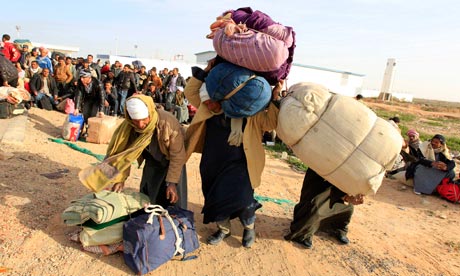By Madeline Schiesser
Impunity Watch Reporter, Europe
HANNOVER, Germany – During Russian President Vladimir Putin’s visit with German Chancellor Angela Merkel at the opening of the Hannover Industry Trade Fair, the world’s biggest industry show, on Sunday, the Chancellor called on Moscow to give non-governmental organizations (NGOs) “a good chance in Russia.”

In a speech to the trade fair in Hannover, Merkel said in front of Putin that while Germany wants to encourage Russian economic diversity and innovation, NGOs are a healthy component of that plan. “We believe this can happen most successfully when there is an active civil society,” she said, “We must intensify these discussions, develop our ideas, and we must give the NGOs, who we know as a motor for innovation, a good chance in Russia.”
Throughout Putin’s visit, protestors rallied against his recent policies. Outside the trade fair, some protestors showed their support for NGOs, while others carried Syrian flags or wore devil masks, waving images of Putin dressed in a prisoner’s striped uniform. One banner read, “Stop political terror.”
President Putin defended the ongoing Russian investigations into NGOs on German television, claiming Russians had a right to know which NGOs were receiving foreign funds “and for what”.
Russian authorities have conducted a storm of unannounced inspections of NGOs in Russia, which appear intended to intimidate these groups. In the last weeks, more than 200 Russian NGOs, as well as foreign organizations, including Amnesty International, Transparency International, and at least two German political foundations, have received surprise inspections by Russian police, tax inspectors, and prosecutors. The crackdown on Russian civil society has drawn widespread international criticism.
The two German NGOs: the Konrad Adenauer Foundation (KAS) in St Petersburg and the Friedrich Ebert Foundation (FES) in Moscow, are of significant political importance to Germany’s political parties because the KAS think tank is linked to Chancellor Merkel’s Christian Democrats, while the FES is particularly close to the main German opposition, the Social Democrats.
While Germany has maintained a close relationship with Russia in many areas, including business and trade, foreign investment, energy security, and cultural issues, Chancellor Merkel has previously emphasized the importance of human rights and the rule of law. She has furthermore come under pressure to address her concerns to Putin, not only on the NGO inspections, but also regarding Syria and Russia’s criticism of the German-orchestrated financial bailout of Cyprus. As explained by Human Rights watch, Russia’s domestic repression of NGOs erodes the foundations of its foreign relationships.
“Trade fairs are about doing business, but Merkel should make clear to Putin that it cannot be business as usual for Germany’s relations with Russia until the attacks on civil society stop,” said Hugh Williamson, Europe and Central Asia director at Human Rights Watch.
President Putin is also scheduled to visit Amsterdam on Monday. Dutch Prime Minister Mark Rutte has also been called upon to demand Putin halt the NGO inspections. Germany and the Netherlands are Russia’s biggest trading partners.
Williamson further said, “This is the worst crackdown in Russia in 20 years. It is admirable to promote deeper understanding between Russia and the Netherlands, but this has very little meaning if vital parts of Russian society cannot express themselves freely.”
For further information, please see:
Al Jazeera – Merkel Chides Putin Over NGO Inspections – 7 April 2013
BBC News – Angela Merkel Tells Vladimir Putin – Russia Needs NGOs – 7 April 2013
Returns – Russia Needs Active Civil Society, Merkel Tells Putin – 7 April 213
The Local – Merkel ‘Should Push Putin for Reforms’ – 6 April 2013
HRW – Russia: Merkel, Rutte Should Press Putin on Rights – 4 April 2013





